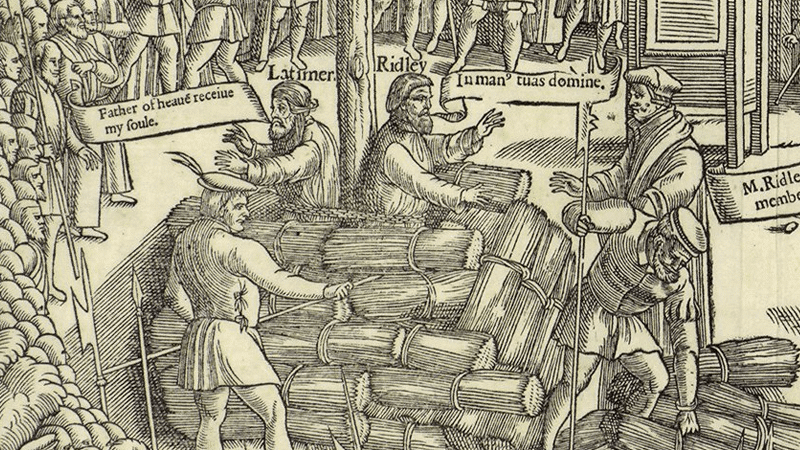Hugh Latimer martyred for his faith in Jesus Christ

On 16 October 1555, Hugh Latimer – widely regarded as one of the foremost preachers of the English Reformation – was burned at the stake for his faith.
Former Bishop of Liverpool J C Ryle once said of the preacher: “No one of the Reformers probably sowed the seeds of Protestant doctrine so widely and effectually among the middle and lower classes as Latimer.”
He provided a clear voice for the truths of the Reformation – proclaiming salvation by grace alone through faith alone in Christ alone.
The poorest ploughman is in Christ equal with the greatest prince
The son of a farmer, Latimer was educated at the University of Cambridge. Initially a loyal defender of Roman Catholicism, he was led to salvation by reformer Thomas Bilney in 1524. Bilney is said to have knelt before him and said “let me tell you what happened to my heart”. The pair became close friends, often meeting for Bible study and prayer.
For Latimer, Christian faith and Christian action went hand in hand. He was renowned for visiting the sick, poor and those in prison. He taught that all jobs and vocations have value. “Let no man disdain to follow him [Christ] in a common calling and occupation”.
As the Reformation picked up pace in England – largely thanks to William Tyndale’s translation of the New Testament – Latimer grew in stature as an evangelical leader. However, he never lost the common touch of his farming background. He understood the “dignity and drudgery” of everyday life, reflecting: “The poorest ploughman is in Christ equal with the greatest prince”.
He was especially critical of clergy who emphasised religious duty, but not the cross of Christ. He encouraged his congregation to see good works, not in the form of penance or lighting candles, but rather as love for their neighbour – feeding the hungry and caring for the sick.
He spoke continuously against Roman Catholic superstition, arguing that peace with God comes through being justified by faith. And he insisted his congregation pray to God alone – at the time a radical concept.
He insisted his congregation pray to God alone – at the time a radical concept
In 1535 he was ordained as Bishop of Worcester. He believed bishops should be preachers as well as administrators. He required priests to memorise the Lord’s Prayer, the Apostles’ Creed and the Ten Commandments. He instructed clergy under his authority to preach the Word faithfully.
In 1553, King Edward VI died. While the Reformation had advanced under his reign, many had also turned against it. Next in line was Princess Mary, daughter of Henry VIII and Catherine of Aragon, better known now as ‘Bloody Mary’. Her goal was to restore the Church of England to the authority of the Pope.
Latin mass, images and holy water were all reintroduced. It was forbidden to preach without a royal licence. Any preacher who spoke against the monarch’s actions was jailed.
For his commitment to the cause of Christ, Latimer became a prime target. Despite being an old man in poor health, an example had to be made. In September 1553 he was arrested on charges of treason and dispatched to the Tower of London. He ended up sharing a cell with Thomas Cranmer, John Bradford and his friend Nicholas Ridley.
In March 1554, Latimer, Cranmer and Ridley stood trial at Oxford. They were asked to agree or disagree with three articles of teaching on the physical presence of the body of Christ in the mass. Latimer held up his copy of the New Testament and said he could not find the mass in it. As he was led away, he knew he would be burned alive.
We shall this day light such a candle, by God’s grace in England, as I trust shall never be put out
He was eventually sentenced to be burned at the stake, which was carried out outside Balliol College on 16 October 1555. Nicholas Ridley was beside him. Cranmer reportedly wept as he watched from his prison cell.
The two men prayed together before being fastened with rope. As the wood caught fire, Latimer was heard shouting through the flames: “Be of good comfort, Master Ridley, and play the man. We shall this day light such a candle, by God’s grace, in England, as I trust shall never be put out.”
Latimer’s courage in the face of death helped ensure that the light of the Gospel of God’s grace would not be put out. Word of his bravery spread across England. Believers were encouraged, the Church was strengthened, and souls were saved.
466 years on we give thanks for the life of Hugh Latimer, and pray that by God’s grace, our nation would embrace the light of the Gospel that will never go out.
A version of this article was first published in 2019.
